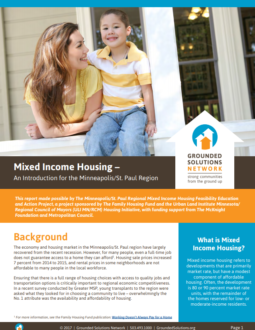Mixed Income Housing: An Introduction for the Minneapolis – Saint Paul Region
Mixed income housing refers to developments that are primarily market rate, but have a modest component of affordable housing. Research indicates that mixed income communities are a key part of building economic prosperity and competitiveness by attracting and retaining residents to support key employers. Ensuring that there is a full range of housing choices with access to quality jobs and transportation options is critically important to regional economic competitiveness.
In 2015 and 2016, the Family Housing Fund and the Urban Land Institute of Minnesota/Regional Council of Mayors partnered to offer the Minneapolis/Saint Paul Region (MSP) Mixed Income Housing Feasibility, Education and Action Project. The collaboration developed and highlighted tools and strategies to help municipalities work with private and non-profit developers to create mixed income housing in the seven-county MSP region. It also provided new innovative ways to learn, experiment and develop policies to incentivize mixed income housing development.
This report provides an overview of mixed income housing policies, including mandatory inclusionary housing, planning and zoning policies, and city subsidies. It also provides case studies of mixed income housing policies at work in the Twin Cities.
Read a summary of this initiative’s findings and recommendations.
Explore how inclusionary policies will affect the economics of a development with this mixed income housing calculator.
